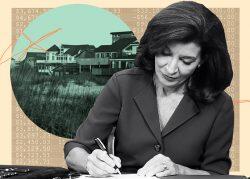One year after the state legislature paved the way for a new East End property sales tax, voters will decide whether to enact it.
South Fork and North Fork residents will start voting Saturday on a 0.5 percent real estate transfer tax to fund affordable housing programs in the region. Backers say it will create housing for some of the workers who maintain properties and staff businesses in enclaves like the Hamptons but can’t afford to live in them.
The surcharge is modeled after a 2 percent real estate transfer tax that goes toward the Community Preservation Fund — which, ironically, has made housing more expensive by limiting development. The fund is used to purchase land and easements.
Last October Gov. Kathy Hochul signed a bill championed by Assembly member Fred Thiele to put the measure on the ballot. Voters in the five towns that make up the East End — East Hampton, Shelter Island, Southampton, Southold and Riverhead — will determine whether the tax is implemented.
Voting begins Oct. 29 and ends Election Day, Nov. 8.
Read more


Such a tax has been gestating in the Hamptons for decades, but the worsening affordable housing crisis has given it momentum. Thiele said the tax would have generated $30 million if it were in effect in 2020. Some low-level transactions and deals in certain areas would be exempt.
Public forums have been held about the proposition in recent weeks as voters prepare to hit the polls. Some officials have said the lack of affordable housing is pricing out wage workers, young adults and seniors on fixed incomes.
“This is a problem for our economy, and it’s really a problem for our communities as well,” East Hampton Town Supervisor Peter Van Scoyoc said during a recent forum, according to 27 East. “The fabric of our community is being eroded.”
The long commute of workers into the Hamptons from points west has become known as the “trade parade.”
The 2 percent preservation tax has been popular on the East End because it limits development and raises property values. But the 0.5 percent tax could draw “no” votes from locals who don’t want to fund affordable housing, especially out of their property sales.
Some Hamptons officials are taking other steps to get more affordable housing. East Hampton’s planning director recently proposed adjustments to local legislation to allow more accessory apartments in town. And Sag Harbor is considering a rezoning to allow 79 low-cost rentals, which has triggered a vociferous debate among residents. An opposition group argues the project must be killed to “save” Sag Harbor.
